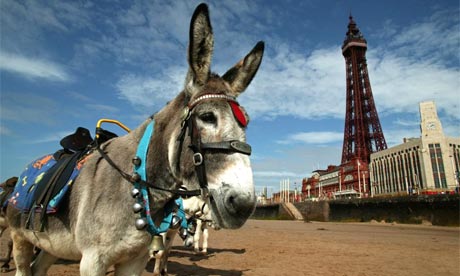
Ever since Victorian holidaymakers rushed to the seaside to don knotted hankies, the postcard image of children riding donkeys has been inextricably linked to British summer holidays.
But today, the tradition is facing restrictions as new animal cruelty guidelines are introduced, banning overweight youngsters from seaside donkey rides.
A donkey code of practice is being brought in to stop anyone over 50.8kg (8st) from riding the animals amid growing fears that Britain's 850 donkeys are buckling under the weight of heavier children and putting their health at risk.
As childhood obesity becomes an increasing problem, a whole generation could miss out on what has become something of a rite of passage at Britain's seaside resorts.
The latest rules, drawn up by the Donkey Sanctuary in Devon and endorsed by the British Equine Veterinary Association, are targeted at all local authorities with beach donkeys – including Great Yarmouth, Brighton and Torquay.
Blackpool beach, which is home to the largest number of beach donkeys in the UK, is likely to see the biggest impact on its 200 animals.
The resort was approached by the charity to accept the first copy of the new code to hand over to the town's mayor, Councillor Robert Wayne, and Joan Humble, the Labour MP for Blackpool North and Fleetwood, at the north pier today.
The Lancashire resort already has stringent employment rights for its animals, brought in three years ago. These include working no more than six days a week between 10am and 7pm, with one full day of rest, a minimum of an hour's lunch break and a donkey 'MoT' at the start of the summer season to ensure the animals are fit.
Council inspectors also carry out spot checks to make sure the animals' rights are respected. Donkeys are also fitted with a microchip so they can be easily identified. These rules are also being rolled out on a nationwide basis along with the rider weight limits.
Donkeys, which were first brought to Britain to toil down mines and can live to the age of 50, are a common sight in Blackpool, plodding along the beach through sun and rain. During a summer season they can take tens of thousands of children on rides at £2 a go.
Despite their indentured servitude, donkeys are actually very intelligent. They have an incredible memory, recognising places and other donkeys from 25 years ago. They were first domesticated around 4,500 years ago and were a status symbol. But unlike horses, they do not have natural waterproof coats so they must have access to shelter.
Martin Taggart, Donkey Sanctuary's head of welfare, said: "We already see an excellent standard of care for many beach donkeys in the UK, including Blackpool. The code of practice will help to support local authorities to ensure all beach donkeys receive the same levels of care.
"The other purpose of the code is to provide a resource of advice and support to those working with beach donkeys or setting up new businesses. We are here to help in any way we can."
Blackpool councillor Henry Mitchell said: "It is 66 years since we recognised that these animals needed protecting against some owners who would work them day and night if they could. The new code endorses what we do already and gives it the backing of two powerful organisations."
The Donkey Sanctuary is hosting a free workshop on how to look after donkeys in Drumnadrochit, near Loch Ness. Similar classes are also being planned throughout the UK and Ireland. Advice will be offered on dental care, warning signs for when to call for a vet and basic first aid.

